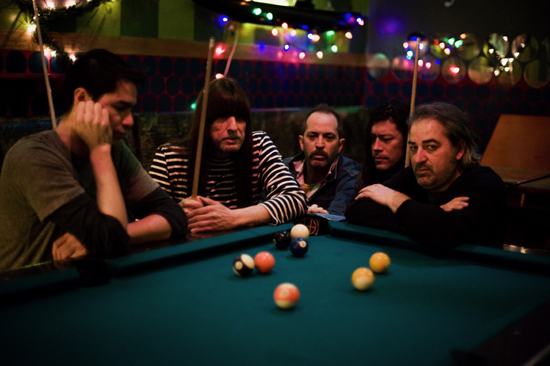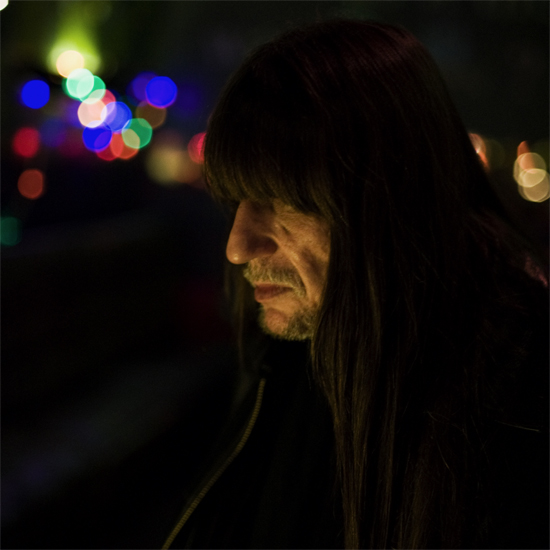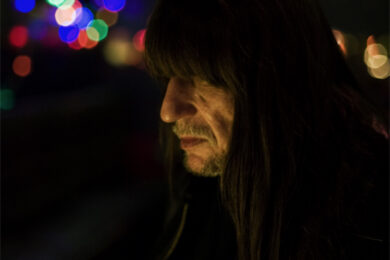Photos by Shawn Brackbill
With their ceaseless, exploratory jams of squalling, extemporising and ever-morphing guitar, New York’s Endless Boogie just might be one of the most aptly named groups in rock history. Forming as a loose, informal Tuesday night jam session in the late 90s, Endless Boogie first stepped out of the rehearsal room near the dawn of this millennium, as personally requested support act to Steve Malkmus and his Jicks.
Since this initial venture into the wider world, the group have played most corners and dimensions of the globe, discovering kindred twisted spirits and spreading their word via elusive slabs of limited vinyl containing peak extracts from their jam-derived rehearsal-room pell-mell. Their latest, Long Island, is perhaps their most composed and coherent yet, but it’s still a loose, wild, barn-burning hour of blackened blues barking, pedal-stomping exercises in breakin’-on-through-to-the-other-side, and mind-expanding jams that fuse the bluesy chug of early Status Quo and the motorik stamina of Can into something you’ll wanna pop under your tongue when the end-times come.
It’s one of the finest albums of the year thus far, so we gave Endless Boogie mainmain Paul Major a quick transatlantic buzz, and he filled us in on the whole rewiring-your-brain-via-awesome-choogle business.
I know you’re on New York time, but where are you actually based?
Paul Major: I live up on the Upper West Side of New York, by Columbia University, by the river. I’ve been here a long time. It’s crazy expensive. When I first got here, at the end of the 70s, the punk rock days, me and my friend got an apartment on Bleecker Street, right by MacDougal, for $200 a month. So my half was a $100. I’m paying 25 times that for an apartment today…
But you grew up in Louisville, Kentucky…
PM: I was born in Kentucky, and lived there until I was eighteen years old. And then I went to live in St Louis and lived there for four years, and that’s where I started having a band for the first time, in the mid-70s. Then the punk rock thing started, so we thought we should move to LA or New York. It was winter 1977, so we chose LA, and half a year later decided to move to New York. Except for a number of years when I was living in the country, married and with a kid, I’ve lived here ever since.
You came of age just as the psychedelic rock age was dawning…
PM: Oh yeah! The timing was incredible [laughs]… I’ve thought about that before. I was twelve years old in 1966, and I was a science nerd, into experiments and thinking about other planets and science fiction and all that stuff. I was oblivious to rock & roll. But then I heard these psychedelic garage hits on the radio – those distorted guitars – and that got me into music. It was getting real creative, so I just shifted gears and got deep into that. Now I can barely add, whereas I used to be a maths prodigy [laughs].
It was a great and mysterious time. I started reading about hippies, acid, the rock & roll explosion, and instantly identified with hippies. It was perfect, I just jumped into it, and it didn’t take me long. I was this little kid digging through all the cut-out bins in the hippy head shops in Louisville, looking for any album that had, like, a ten minute long song with a weird title that referred to tripping. I was totally isolated – I remember rumours going round that a guy in another school had long hair [laughs] – until finally in high school I made some friends and started jamming and stuff like that. But the timing was amazing: it seemed like some supernatural thing was going on, hearing those early psychedelic garage tracks in 1966 and 1967.
‘Taking Out The Trash’, taken from the Long Island album
Being in Louisville, being that young, you probably weren’t having psychedelic experiences along with the psychedelic rock you were listening to…
PM: That came later, towards the end of high school… I was like sixteen, seventeen before any of that happened. So it was several years of just listening to the records and lighting incense in my room, and opening the windows because my mom was suspicious of even the incense…
But you had an idea that this music was connected to the psychedelic experience, that it could be transcendent.
PM: Yeah. And I think it stuck with me, that feeling, because now I’m, like, a lifer, and my life revolves around music. And it was sparked by hearing those first early things, getting into the music and, later, meeting people who were into it, after a long isolation, running into people when I lived in St Louis and saying, ‘We should start a band’.
I was and am big into the record collecting thing. Back before the internet and eBay, I used to exchange catalogues with other collectors around the world. It was like a big adventure. I’d be looking for bands that go crazy, bands that sound like what I’m playing now. Endless Boogie got started through those catalogues. I’d been sending them to a bunch of guys in Sweden, and one of them, Johan Kugelberg, moved over here to New York. After I got divorced and moved back to New York, I met him in person, and he had this idea that we should have a fun band and call it Endless Boogie, and we’ll just jam, and that’s all that we’ll do. And we did it for years, every Tuesday night, him and Jesper Eklow and me, and then Mark Ohe on bass, up until a few years ago. But it was just a friend thing for the longest time, Tuesday nights. We had a place we could play, a loft our friend Matt has.
And then, finally, we broke down and played live shows. People just started twisting our arms, saying, ‘Will you open for our band?’ We never thought of doing that, we weren’t thinking that way. We were doing it for the love of it. And that’s how we did it – we were, like, let’s not calculate a set, let’s dive right into the moment. For me, it’s an amazing full-circle vibe to back when I was a kid and all that, and now getting to go play loud, noisy, brutal guitar onstage. It’s all a part of the record-collecting thing: that’s how I got in touch with Johan, how I met people. It pulled me back into actually playing.

Before you hooked up with Johan, did you have a feeling like you wanted to start making music again?
PM: Yeah, but I didn’t know what to do with it. My life was pretty crazed out, I had no direction… It’s more almost a case of just doing the thing and it happening, than trying to do it. That was our thing – we decided Endless Boogie wouldn’t do anything except what we do. It’s really a live band type thing – we’re trying to get people off, and when the girls start dancing, that’s when it all starts happening, and we start feeding on it, and it becomes this thing, without having any message except ‘Have fun’. [laughs] And then we’re all riding this wave, and it’s rocking.
We used to just record jam tapes, and the first few albums we put out ourselves were culled from endless piles of jam tapes that we made. We can’t be one of those bands who do overdubs and record one part at a time, so we set up live in the studio, try to get some separation on where the amps are, and then we start doing a live thing. We mess around with the best bits, record a whole bunch, then we’re like, ‘Ooh, I like that one’, ‘Maybe we’ll screw around with that a little bit’. The records are mostly live, there’s a minimal amount of anything else.
I wrote a piece for the Guardian last year, about how awesome long pieces of music are, the magic of the extended jam, and breaking the three-minute barrier… The impact a long piece of music can have. There’s something in that, isn’t there?
PM: Yeah. And it can only be done when you’re in an exploring mode. We don’t even talk first, we just start playing – maybe someone will say, ‘Let’s go in A’ and we’ll see what happens. It’s an exploring thing that pulls it together, that pulls in everyone around you, and you don’t get that when you’re doing a performance where you’re repeating your idea of your statement, or something. It’s like, right away something is missing, when you see a band and they’re thinking about making their performance really good, because they’re looking to be somewhere else, to get somewhere else, to be ‘big’ or famous. Once you start calculating what you do, once you start thinking, ‘Oh that was a really great lick, I’m going to play that at every show’, it’s like you get out of the moment. It’s not like when you’ve got an idea, and you’re crawling right inside it, and you’re getting on the jetliner along with everybody. Not to say I don’t enjoy all kinds of music, and it can almost be like a disease, when you hear so much great music… You can become academic about it. The more there is the better. But let it get you, don’t try to go get it.
How conscious are you, when you’re up on stage, of what is happening? Are you conscious of what you’re playing, or are you just feeling it as you go along? Is it an intellectual thing, or is it more instinctive than that? How much of it is responding to the other musicians, and how much of it is playing what you want to play?
PM: It’s a ‘feeling it’ thing. It’s like we go to get to the place where we’re all riding the same wave. And when that happens, it could go on for the whole set – it’ll take off, and the whole set will be one long jam. As long as it doesn’t get exhausted. If we sense we’re losing the enthusiasm, if it doesn’t seem like it’s on the edge, then we’ll shift gears. It’s more like driving than trying to communicate a song.
When you formed…
PM: It was 1999, I think. It’s a little murky there in my mind, but it was near the end of the 90s.
Nowadays, there’s a scene, a context of groups within which you make sense; groups like Comets On Fire, like Purling Hiss. Kindred spirits. When you started in 1998, I don’t imagine that was the case.
PM: Yeah. We started getting lumped into some scenes later, like stoner rock – people would call us that – but it really was completely its own thing. We always had friends in bands that we were into, but I can’t think of bands who were like us when we started. When we started playing shows, back in the early 00s, it was rare that we weren’t on with bands who played 3 or 4 minute songs. Unless we were playing some art gallery show or some avant garde thing, there didn’t seem to be other free, in-the-moment bands that we were playing with. Of course, now we’ve gotten overseas, we’ve found kindred spirits in every city, people for whom the music is central to their lives in a lot of ways, like it is to mine. It’s like recognising people who you already know. It’s about the live music, the moment, getting into it as a thing.
I heard you played a party at a biker club back in Brooklyn a few years back…
PM: It was for a friend of a friend, he was a member of a biker gang called the Unknowns over in Brooklyn. He needed to raise some money for his lawyers, so it was a benefit thing. It was really memorable for us, because it’s, like, an environment that’s really and truly down with heavy rock. With our backgrounds, we didn’t grow up in this brawling, wild renegade thing, so it’s exciting for us to get people off who are authentically into that, without any irony or anything. It’s that feeling again – kindred spirits. Like, our lives are a lot alike. It was a great night, great playing, great people. Somehow we’ve had shows along those lines, and yet still we find ourselves in art galleries – two entirely different scenes, but it works both ways, and I guess what works is the way you approach it, in the moment, doing the same thing. Normally, all these things get genre-ised, compartmentalised, like stoner rock and all these movements. So getting outside of that is the most exciting thing. All walks of life can boogie!



